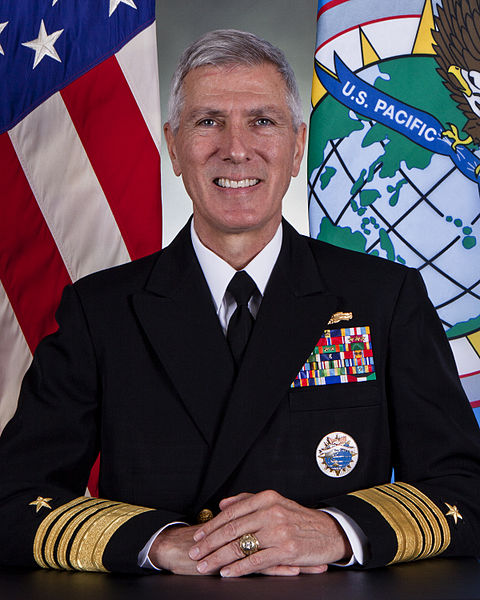 |
| Adm. Locklear (Wiki Info - Image: Wiki) |
By Donna Miles
American Forces Press Service
WASHINGTON, Feb. 7, 2013 – The top U.S. commander in the Asia-Pacific visited Brunei to extend U.S. support to government and military leaders working to build closer multilateral cooperation across the region.
Brunei is expected to assume chairmanship of the Association of Southeast Asian Nations this summer.
Navy Adm. Samuel J. Locklear III, the U.S. Pacific Command commander, emphasized the U.S. interest in forging a closer partnership with Brunei during three days of meetings with the nation’s sultan, crown prince, defense minister, military commander and other leaders.
“We look forward to a rapidly growing relationship in the months and the years to come, and we look forward to a good partnership with the military here, as well as the officials in Brunei,” Locklear told students during an address yesterday at Brunei’s command and staff college and defense academy.
But transnational security challenges -- which range from natural disasters to trafficking, extremist states such as North Korea and the potential rise of violent extremist organizations -- require more than bilateral security relationships, he told the students, Brunei’s next generation of senior military leaders.
Locklear commended the tiny nation on the northern coast of Borneo for its big role in regional security, particularly as it helps to galvanize regional cooperation to address regional challenges. In addition to assuming the reins at ASEAN, Brunei is preparing to host a major humanitarian assistance and disaster relief exercise.
While multilateralism is important in the Asia-Pacific, Locklear said, the region’s vast expanse and diversity would make a NATO-like organization inappropriate. Rather, he said, the future security of the region will depend on a “network of security mechanisms” that together form a “patchwork quilt” of security.
Locklear expressed hope such an arrangement would be inclusive so it can encourage China and other rising regional powers to participate as strong security partners.
“As we look at this vast area, what we need is to be able to work together -- everyone, not just a few, not leaving anyone out,” he said. As a result, he added, nations will be able to understand, communicate and operate with each other, “and be able to have the security network that allows us to withstand shocks.”
Those inevitable shocks, he said, include natural disasters and pandemics that could affect millions of people and, as a consequence, undermine security. That underscores the importance of humanitarian assistance and disaster response cooperation among regional militaries “to allow us to respond to a disaster in a way that doesn’t disrupt the security environment,” he said.
Locklear noted the upcoming exercise in Brunei, calling it a “landmark of cooperation” among defense forces from ASEAN, Australia, China, India, Japan, South Korea, New Zealand, Russia and the United States.
The United States will contribute a logistics ship, medical teams and planners. However, Locklear made it clear that the U.S. military will be a participant, along with other militaries, and that Brunei will lead the event.
In addition to building regional capacity to deal with nontraditional security challenges, the exercise represents “a great opportunity for all of us involved to learn more about each other and to enhance our ability to respond together, when needed,” he said.
Asked about territorial disputes in the South China Sea, the admiral said history is marked by similar disputes and that they should be expected in the future. “What we need is a security environment that is so good that it can withstand the friction and provide the peace and stability that allows diplomacy to work through these issues,” he said. “That is the only successful way.”
Locklear expressed hope that ASEAN will be able to reinvigorate its efforts to reach agreement on a framework for resolving the territorial disputes between Brunei, Vietnam, the Philippines, Malaysia, China and Taiwan.
“We desperately need a code of conduct,” he said, noting that it would provide “rules of the road” for military commanders or law enforcement agencies operating close to each other in disputed areas.
Developing this code of conduct, he said, will be “an important step in ensuring … a framework that allows dialog and diplomacy to work.”
Locklear underscored the longstanding U.S. support to this and other efforts that promote regional security.
In rebalancing its focus toward the region, Locklear said, the United States is reaffirming the growing importance of the Asia-Pacific region. It also is building on historic U.S. military ties there “that have contributed to the security environment in this part of the world, I believe, in a very positive way for the last 70 years,” he said.
“The United States is a Pacific nation,” Locklear said. “We are committed to our friends and allies and our partners and the security of the Asia-Pacific. It is in our best interest, and we believe it is in the best interest of peace and prosperity for everyone in this region.”
